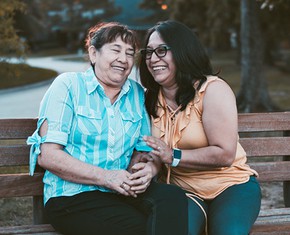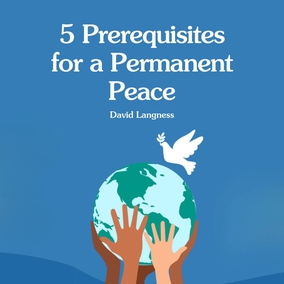The views expressed in our content reflect individual perspectives and do not represent the authoritative views of the Baha'i Faith.
We tend to focus on youth and adults when we think about improving the world, but we shouldn’t forget—there are no better agents of change than children.
Adults can sometimes be close-minded, afraid, or reluctant to embrace new ways of thought. Children, on the other hand, are much wiser and more alert to the realities of society than we think.
If we’re planting unity throughout the world, no place could possibly be more fruitful than the fertile greenhouse of a children’s class: a safe, joyful space where children can learn about their own souls and their roles in the world, and the unity of all humanity can be sown, watered and grown. Baha’u’llah said:
Address yourselves to the promotion of the well-being and tranquillity of the children of men. Bend your minds and wills to the education of the peoples and kindreds of the earth, that haply the dissensions that divide it may … be blotted out from its face, and all mankind become the upholders of one Order, and the inhabitants of one City. – Baha’u’llah, Gleanings from the Writings of Baha’u’llah, pp. 333-334.
Baha’is build children’s classes on this very concept. They aren’t classes in a schoolroom style; they’re a structured space, free for everyone, that fosters learning, communication and interracial, interreligious and intercultural unity. The Baha’i teachings say “Be thou a teacher of love, in a school of unity.” – Abdu’l-Baha, from a tablet translated from the Persian.
Keeping this in mind, and trying our best, a friend and I started our children’s class in a small neighborhood in the northeast United States, with the intention of getting to know a community of people within a small radius: a group of families that could connect, share spiritual concepts and serve the community around them together—with the energy, love and joy of children at the forefront.
The group that eventually formed was small, but very diverse: three of our students were from Nepali families that followed Hinduism; another was from a Catholic family that only spoke Spanish. All of them were between the ages of four and ten, and they were full of energy.
Two girls in the class were best friends despite the fact that neither of their families had a language in common. But when we spoke to the Nepali family of one girl (with the help of a friend who translated) and to the Latino family of the other girl in Spanish, we realized that both families knew a lot about each other through interacting regularly because of their children. In a society where it’s easy to live in a bubble of one’s own culture, these two little girls had managed to help their families respect and admire each other, even when they couldn’t exchange a word.
One girl’s father still works in South Asia, the girls told us. “But it’s okay,” the other girl said proudly, pointing out that they often get ice cream together with her family. “I share my dad with her.”
To this already beautiful set-up, we brought the idea of Baha’i children’s classes. In these classes, we discuss an inner spiritual virtue—such as truthfulness, kindness, or excellence—and explore the concept through prayer, songs, stories, art and games. Our students’ favorite song was one called Fountain of Generosity, which goes:
Be a fountain, be a spring
Be an ever-flowing thing
It is true that if you do
God will always be with you
Search your heart, every day
Is there something you can give away?
They sang it over and over, even when they were coloring, and asked to copy all the lines of the song onto papers they could keep. Something about it resonated with them in a very profound way, just like the stories did. They loved talking about God. While in some of our students’ cultures, the Creator exists in the form of many gods, they seemed to recognize the God we spoke of and their gods as one and the same. After all, devotion is the same across all cultures, and the children recognized this unity.
Prompted by the question “How can we show that we are thankful to God?”, the children shared with us different practices in their homes in which they identified that virtue of gratitude:
“We put an extra plate of food on the table whenever we eat to thank the gods.”
“We pray before each meal to thank God for taking care of us.”
“Our grandfather wakes up at dawn, takes a bath to be clean before the gods, then prays. He doesn’t eat until he prays.”
We do children a severe injustice when we believe they are unaware of the things happening in the world around them. Even small children understand the concept of thankfulness—and identify how it plays out in the world around them, to reflect on what they have seen, and to see how they will apply these learnings to their own individual lives.
Children are also very aware of injustice. During one class, it all seemed to escape them in a rush. A combination of television, overhearing conversations, and their natural childish curiosity had led them to discover the horrible fact that children could be kidnapped—something that disturbed them, naturally. They wouldn’t stop talking about it. They explained to us all the different ways they thought people could be kidnapped, and this led to talking about children stealing, children disrespecting their families, children fighting …
We didn’t say much for a while, and just let them speak. Though their understanding of many situations is still limited, they fully understood the spiritual circumstances involved. They spoke to us and to each other about the disunity and sadness in the world, still sitting in a little circle, patiently waiting for each other to finish before making their point. They knew that in the children’s class, they would be taken seriously.
Finally, we asked: “So how can we stop these bad things from happening? How can we help others, and be a good example?”
There was a long moment of silence, as the children’s expressions turned thoughtful.
Suddenly, a little boy jumped up and raised his hand. “I know, I know!” he exclaimed. Then in a sweet, melodious voice, he sang: Search your heart every day/is there something you can give away?
The Baha’i teachings say:
The education and training of children is among the most meritorious acts of humankind and draweth down the grace and favour of the All-Merciful, for education is the indispensable foundation of all human excellence and alloweth man to work his way to the heights of abiding glory. If a child be trained from his infancy, he will, through the loving care of the Holy Gardener, drink in the crystal waters of the spirit and of knowledge, like a young tree amid the rilling brooks. And certainly he will gather to himself the bright rays of the Sun of Truth, and through its light and heat will grow ever fresh and fair in the garden of life. …
If, in this momentous task, a mighty effort be exerted, the world of humanity will shine out with other adornings, and shed the fairest light. Then will this darksome place grow luminous, and this abode of earth turn into Heaven. – Abdu’l-Baha, Selections from the Writings of Abdu’l-Baha, pp. 129–131.
For children, no challenge is too unsurmountable, no concept too difficult—especially not unity.
















Comments
Sign in or create an account
Continue with Googleor